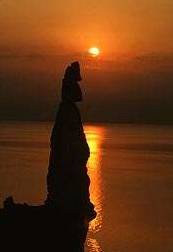

Armed to the teeth
This is a pirate phrase originating in Port Royal Jamaica in the 1600's. Having only single shot black powder weapons and cutlasses, they would carry many of these weapons at once to keep up the fight.
In addition they carried a knife in their teeth for maximum arms capability.
Bouched up (spelling has become BOTCHED UP):
Sir Thomas Bouch designed a bridge that was built at the Tay estuary at Dundee in Scotland. It was supposed to be the greatest structure built in Victorian England. The building of the Tay rail bridge culminated in him being knighted. The Tay bridge was nearly two miles long, consisting of 85 spans and at the time (1879) was the longest bridge in the world.
One stormy night, only 19 months after the bridge was declared safe by the Board of Trade and opened to traffic in the summer of 1878, the wind caused some of its spans to collapse. A train and 6 carriages and 75 souls were lost that night ranking it as the worst accident caused by structural failure in the history of England. Sir Thomas Bouch died only 10 months after the failure.
Clean bill of health
This widely used term has its origins in the "Bill of Health", a document issued to a ship showing that the port it sailed from suffered from no epidemic or infection at the time of departure.
Dead as a door nail
Nails were once hand tooled and costly. When an aging cabin or barn was torn down the valuable nails would be salvaged so they could be reused in later construction.
When building a door however, carpenters often drove the nail through then bent it over the other end so it couldn't work its way out during the repeated opening and closing of the door. When it came time to salvage the building, these door nails were considered useless, or "dead" because of the way they were bent.
Dressed to the nines
Common lore has it that a tailor making a high quality suit uses more fabric. The best suits are made from nine yards of fabric. This may seem like a lot but a proper suit does indeed take nine yards of fabric. This is because a good suit has all the fabric cut in the same direction with the warp, or long strands of thread, parallel with the vertical line of the suit. This causes a great amount of waste in suit making, but if you want to go "dressed to the nines", you must pay for such waste.
Worth his salt
Today salt is inexpensive and universally available, but that wasn't always the case. Salt has been a valuable commodity in many cultures throughout history.
Because of salt's high value, it was used as a method of exchange. Roman soldiers received a salt allowance as part of their pay. In fact the word "salary" is derived from the Latin "salarium" meaning "of salt".
To say that someone is "worth his salt" is to say they have earned their pay.
Square meal
British war ships in the 1700s including the HMS Victory did not have the best of living conditions. A sailors breakfast and lunch were sparse meals consisting of little more than bread and a beverage. But the third meal of the day included meat and was served on a square tray. Eating a substantial meal on board a ship required a tray to carry it all. Hence a "square meal" was the most substantial meal served.
Sleep tight
Before box springs were in use, old bed frames used rope pulled tightly between the frame rails to support a mattress. If the rope became loose, the mattress would sag making for uncomfortable sleeping. Tightening the ropes would help one get a good night sleep.
Reading the riot act
Reading the riot act" used to be a literal event. Bobbies in Britain used to read a prescribed proclamation, known as the Riot Act, before they could break up or arrest a crowd. The Riot Act is used in a fashion similar to the Miranda Rights in the US.
The Bobbies would approach the crowd, read the Riot Act aloud, and then disperse or arrest them.


you forgot the "whole 9 yards" which refers to Scots Kilts which were up to 9 yards long and wrapped around a man to form the kilt skirt and shoulder wrap. you had to purchase the WHOLE 9 Yards or tartan wool to make one kilt!
ReplyDelete